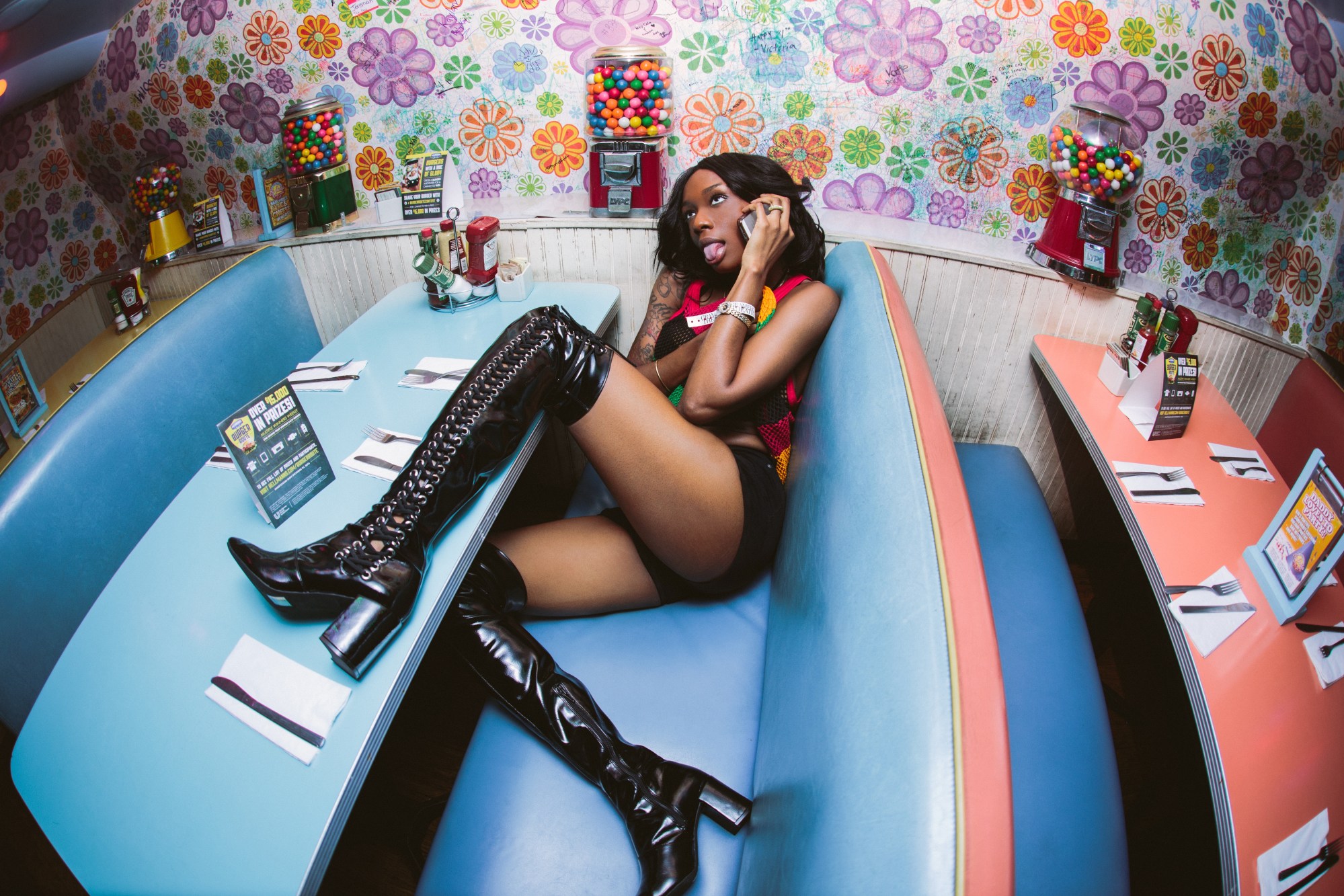Don’t say that Junglepussy is merely back. “Whenever I see that line, it blows my mind. It’s like I died! People need to stop doing that,” Shayna McHayle says of her rap persona’s much-awaited return between sips of mint iced tea. “It’s not healthy for anybody to feel like two years is disappearance or irrelevance when people are out here trying to survive.” She’s gearing up for the release of her new album, JP3, which drops tomorrow, May 11. But the reality that her long-awaited LP will soon be heard by the world hasn’t quite yet materialized. “Mercury retrograde had to end for it to feel completed,” she says. “It just happened.”
Unlike her last major release, 2015’s Pregnant With Success, a project that was described as an ode to motherhood, this one arrives with no such pretext. It’s simply titled JP3. “I’ve always wanted a project where the music speaks for itself, and I feel like this allows for that,” she explains. McHayle is a perfectionist. The Brooklyn artist grew up in the age of the mega pop album release, tirelessly studying interviews of artists she admired. It’s not that she hasn’t been constantly creating in the years since Pregnant, it’s that she values the sanctity of separating process from final product. “I’m looking at the hyperproductivity thing, and I see what you guys are trying to do,” she says. “But I don’t think it’s natural.”
From the opening pomp of “State Of The Union,” JP3 feels like a self-assured reintroduction of sorts. It’s a lush, brazen joyride that sounds effortless, brimful of humor and sexuality. It’s destined to go down as one of the most straight-up fun hip-hop releases this year. But beneath its structure exists a more probing question of how we chose to present our identity in a world where everyone’s watching. “When I put my first song out, let alone my first project, I just couldn’t believe that there were people on earth who could relate to me because I never felt like I was relatable. I didn’t know how to handle it,” she says. “I didn’t know I was making music that empowered people.”
A pivotal moment in JP3’s creation, McHayle tells me, came when she heard Black Girls Rock founder Beverly Bond discuss impostor syndrome, defined as a “psychological pattern in which people doubt their accomplishments and have a persistent, often internalized fear of being exposed as a ‘fraud.’”
“It’s the way I’d been feeling the entire time I was creating the album,” she says. “Anyone can relate to feeling like you’re not as great as you are. That’s the simplest reason why people don’t go at their dreams full throttle. Knowing the divine responsibility that has been bestowed upon me as a black woman, I felt as though I had to go super introverted. I didn’t know that I could create and share and grow.”
For Junglepussy, grappling with that meant examining residual trauma from her Brooklyn adolescence. “Growing up in New York City and being harassed by men on the street for being my flamboyant, feminine self… I let that strip away some of my expression,” she says. “That’s why when ‘Junglepussy’ started popping off, I didn’t want colored hair anymore, I wanted black hair. I didn’t want to be noticed in the streets.’”
The JP3 album artwork (which McHayle painted herself, along with that of each single), references this internal and external struggle. “When I didn’t want to be seen in New York, I got this short wig with slivers of dark green in it. The hair on the cover was what I wore the whole time I wrote the album,” she pauses, before adding, “I knew I wanted it to be neon green, but I kept trying to minimize myself.”
“When I grew up, even when I first decided to do music, I’d say ‘Oh, yeah whatever, I’ll just save that for my E! True Hollywood Story or my Behind The Music’ because that’s how we grew up… I have to tell myself, ‘Shayna, stop getting wrapped up in these blueprints that you think you know!’” she exclaims. That is to say, she’s still learning how to balance contextualizing her work with respect to the pop cultural canon she grew up with, versus letting it speak for itself in this age of digital immediacy. “I remember wanting a mentor so bad. Now you can get mentorship from an artist through DMs.”
But there can be a sweet spot between knowing your musical lineage and utilizing it within the landscape of social media. Case in point: JP3’s steamy third track “Long Way Home,” which features the legendary Gangsta Boo — the first (and only) female member of Three Six Mafia. “I just slid in her DMs and she was down,” she explains. “We met at a party in LES and had mad fun. Life went on, years passed, and then we got to work on a poppin’ ass track together. As soon as she sent me her verse I could not stop playing it.”
Later this year, she’ll make her big screen debut alongside Regina Hall in Support the Girls, an experience she gushes about. It’s a fitting role for McHayle, not simply because she exudes theatricality, but because she’s still fascinated by how humans internalize narrative. The penultimate track on JP3, “Trader Joe,” humors the idea of wanting a boyfriend for the sole purpose of carrying the groceries. “Do I really want a boyfriend or do I love the idea of it? Yeah, obviously I love the idea of it because Disney grew us up with the idea of how life should be,” she laughs. “Life isn’t a movie, even though movies are inspired by life. I have to let go and unlearn so much. I can open myself up to other ways of being with someone. What the fuck!” Junglepussy may not have all of the answers yet, but she’s ready for you, regardless.
